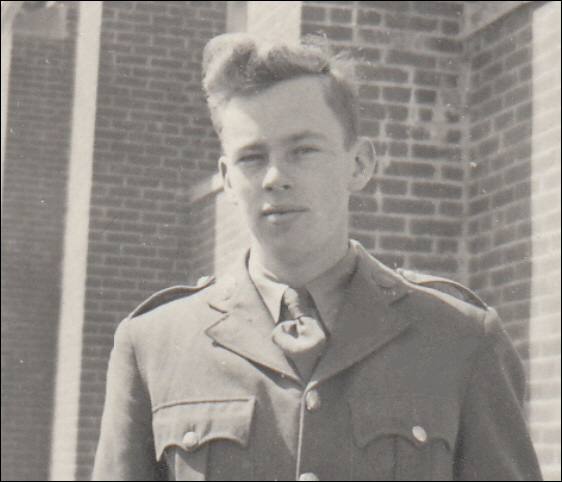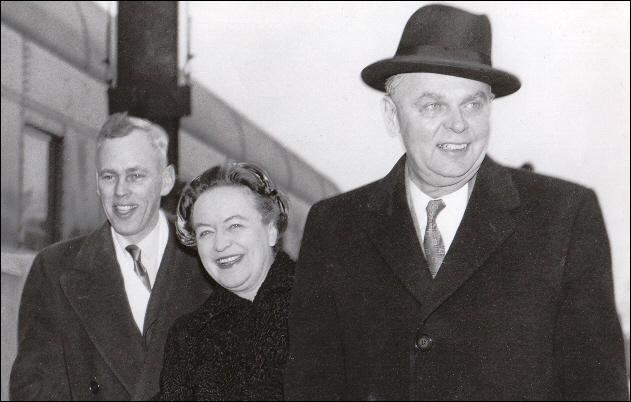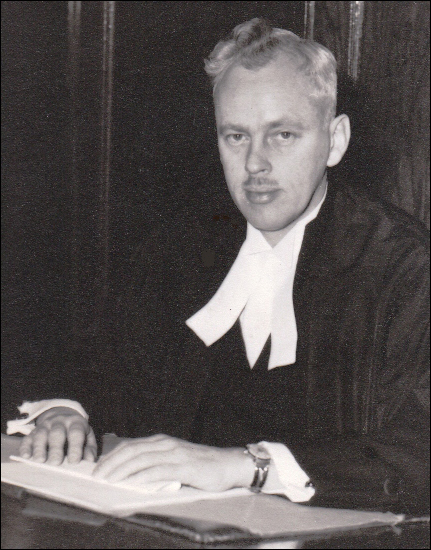He returned from the Royal Canadian Artillery, went to law school and then to Ottawa in the Tory sweep of 1958, but was relegated to the back benches. He was the last active judge appointed by John Diefenbaker*
*For a wonderful documentary on Diefenbaker, Google “Dief NFB”
By F.F. LANGAN
Bill Creaghan was 19 when he heard the news on the radio on Dec. 7, 1941. The Japanese had just bombed the Americans in Hawaii and what had been a mostly European war suddenly became a much wider conflict. He dropped his studies and joined up to fight. By the summer of 1943, he was a young artillery officer fighting in Sicily. He later returned home to New Brunswick to become a lawyer and a Tory MP in the Diefenbaker sweep of 1958 and finally a judge on the Court of Queen’s Bench, trial division.

|
| Bill Creaghan joined the army in 1941 when he was 19. He returned home in 1945 with the rank of captain |
A lawyer’s son, he spent his early years in Newcastle, N.B., the town whose most famous son was Max Aitken, who, as Lord Beaverbrook, went on to become a British newspaper owner and politician. For a time, young Bill went to Harkins Academy in Newcastle, but after his family moved, he graduated from Moncton High School in 1939.
That September, Canada declared war against Germany. Too young to enlist, he enrolled at St. Francis Xavier University and settled down to his studies. For a year or so, it seemed as if the war would pass him by, and then everything changed. The Japanese launched a surprise assault on the U.S. fleet in Pearl Harbour, and hours later attacked Canadian and British troops in what would become the Battle of Hong Kong.
Mr. Creaghan (pronounced Cree-an) listened to the news on the radio and resolved that the war was not going to pass him by.
“I remember enlisting on the day Pearl Harbor was attacked,” he told a reporter 66 years later. “Two or three of us went to Halifax and I joined the armed forces.”
By July of 1943, he was overseas as a young officer in the Royal Canadian Artillery, fighting in Sicily in support of the 1st Canadian Corps. After the Battle of Sicily, the first major Allied attack on German-occupied Europe, his unit crossed to mainland Italy in the middle of August. While Sicily fell relatively quickly, Italy proper was a different story. Masters of defence, the Germans conceded little and made the Allies fight for every kilometre of ground so that by late 1944, the Allies had advanced little beyond Florence. In February, 1945, the entire 1st Canadian Corps received new orders. Along with his artillery brigade, Mr. Creaghan and the rest of the division were put on ships and transferred to Northern Europe for the liberation of the Netherlands and for the final assault on Germany.
In August, 1945, Mr. Creaghan returned home with the rank of captain and was posted to Camp Debert near Truro, N.S., to prepare to be sent to the Pacific. That month, the U.S. Army Air Force dropped atomic bombs on Hiroshima and Nagasaki, ending the war with Japan.
Freed from the war, Mr. Creaghan went to Dalhousie University and enrolled in law school. Like many other young men returning from the war, he had decided to make up for lost time. After all, the government was paying.
“I knew that the re-establishment credits that I was entitled to included tuition,” he said in 1997. “I was fairly young...I had no job to return to, so I decided to increase my education.”
In 1948, he was called to the bar and joined his father’s law firm in Moncton. Around that time, he became acquainted with a young nurse who had left town to work in Montreal. Her name was Thérèse LeBlanc and she had returned home to look after her sister, who was ill. They began seeing each other and before long, a relationship developed. They fell in love, married in 1950 and together had three children, Lawrence, Andrew and Valerie.
It wasn’t long before Mr. Creaghan became involved in public life. In 1952, he became a registrar of probate for Westmorland County and then was elected an alderman in Moncton. As a councillor at large, he handled finance and police matters rather than dealing directly with constituents’ problems.

|
| Bill Creaghan campaigning with Olive and John Diefenbaker in 1958. During that election, the Tories won what was then the largest majority government in Canadian history |
Five years later, he ran for the Progressive Conservatives in the 1957 federal election. At the time, the Westmorland area was a Liberal stronghold and he lost, but the Tories managed to form a government under John Diefenbaker. In 1958, Mr. Diefenbaker called a snap election in an effort to win a majority and Mr. Creaghan tried again. The Tories won what was then the largest majority government in Canadian history – a record surpassed only by Brian Mulroney in 1984 – sending Mr. Creaghan off to Ottawa.
With so many new Tory MPs in Parliament, it was difficult for a young first-timer to get anywhere near cabinet. He spent almost five years on the back benches before losing his seat in 1962 to Liberal Sherwood Rideout, the mayor of Moncton.
Mr. Creaghan never made another attempt to win a seat. But Mr. Diefenbaker pulled some strings, and the former MP was named a judge in the county court for Northumberland, Gloucester and Restigouche, allowing him to move back to Newcastle.
In 1968, he was appointed to another court by John Turner, then Liberal minister of justice, and Mr. Creaghan and his family moved to Fredericton.
Eleven years later, New Brunswick decide to merge the County Court and the Supreme Court into a new entity called the Court of Queen’s Bench, which is where Mr. Creaghan would stay for another 19 years.
“The merger was great for rural New Brunswick. Now, every month, the Court of Queen’s Bench opens in each district and judges live in those districts,” which meant a lot to someone who was languishing in jail waiting for trial, he once explained.

|
| In 1962, Bill Creaghan was appointed a county court judge in New Brunswick |
In 1979, he presided over the longest trial in New Brunswick history. It was called the Land Fraud Trial and involved five defendants and more than 30 charges. Because of the complexity of the case, there were 500 potential jurors. The jury selection process moved from the court room to the Playhouse theatre in Fredericton, which was a first.
The trial opened in February, went on for five months and ended with the jury acquitting all the accused. Mr. Creaghan said the long trial required a lot of patience. “You must keep your cool. You see when you’re presiding in court you have to hear both sides of the facts. It’s best to sit and be patient. Interfere as little as possible,” he said years later.
His colleagues said his judgments were always sound, and that he was a true gentlemen. “He was always very courteous in court,” said his friend and fellow judge, David Dickson. “He served more years as a judge than just about anyone in Canada.”
Few of his cases were appealed. In one family law case, he ruled that most of the assets in a marriage belonged to the wife. The judgment was contested and the Appeal Court in New Brunswick overturned his decision. However, that was not the end of the story. “It was appealed to the Supreme Court of Canada, where my judgment was confirmed unanimously,” recalled Mr. Creaghan.
In 1992, he and another judge chaired the Electoral Boundaries Commission. The two men travelled the province, listening to the views of citizens. The result left New Brunswick with 55 electoral districts, three less than it had before. However the redistribution did things such as give three members to the city of Fredericton, one more than it had in the past.
In 1997, Mr. Creaghan decided to retire – he was the last active judge appointed by Mr. Diefenbaker. But he remained busy. The next year, he was asked to head a provincial child-death review committee whose mandate was to examine the deaths of youngsters who had been in the care of the provincial Health and Community Service Department. The inquiry was called after a New Brunswick toddler had died from neglect.
Although a loyal Tory, Mr. Creaghan also enjoyed many Liberal connections. His niece Julie, for example, is married to Frank McKenna, the former Liberal premier of the province. As a man with a Francophone wife, he was conscious of the bilingual nature of New Brunswick. Though his spoken French was poor, he could read French well.
Over the years, he never spoke much about his experiences during the war, but always turned out for the Remembrance Day parade and other veterans’ events, his eight medals displayed on his Royal Canadian Legion blazer.
Mr. Creaghan liked to curl and play golf and he enjoyed nothing more than schmoozing with friends, discussing everything from local politics to world events. His son Lawrence said that in recent years, he held court every afternoon at a Tim Horton’s in Fredericton.
BILL CREAGHAN
William Lawrence Marven Creaghan was born May 30, 1922, in Newcastle, N.B. He died Oct. 1, 2008, in Fredericton after suffering a heart attack. He was 86. He is survived by his wife, Thérèse, and by children Lawrence, Andrew and Valerie.
Special to The Globe and Mail


